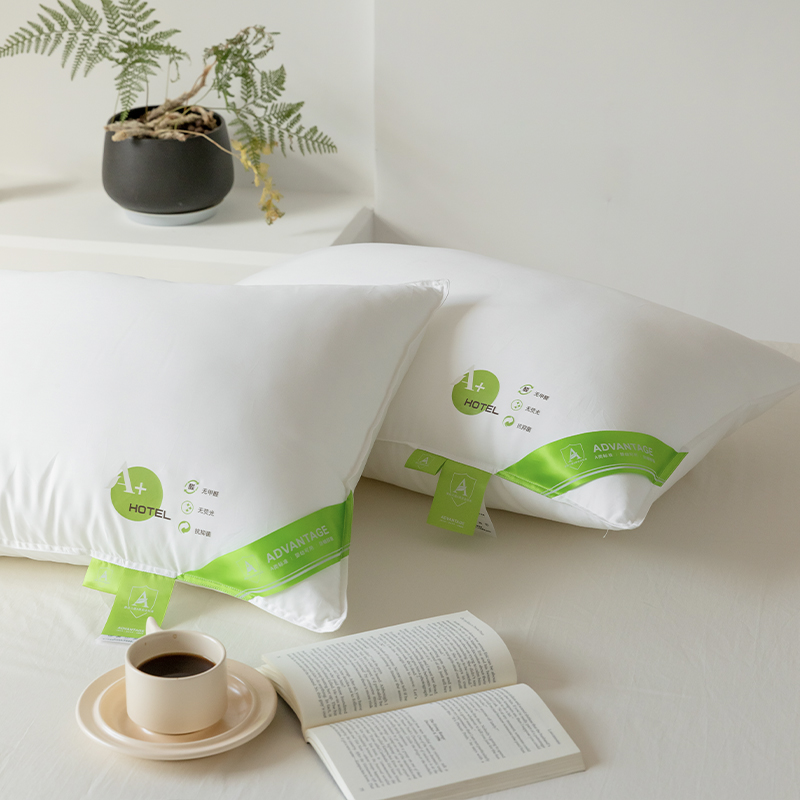In the quest for a perfect night's sleep, the choice of pillow is very important. The market offers a plethora of options, but cotton pillows stand out for their natural benefits and versatility. This article delves into the nuances between cotton fabric pillows and cotton filled pillows, exploring the materials that make them up and the unique advantages they offer to sleepers of all preferences.

Cotton Fabric Pillow vs. Cotton Filled Pillow
Cotton Fabric Pillow: This usually refers to a pillow whose outer fabric is made of cotton. Cotton is a natural fiber with good air permeability and strong hygroscopicity, making it suitable for making pillow covers. Cotton fabric pillows can be filled with various materials, such as down, memory foam, latex, etc.
Cotton Filled Pillow: This refers to a pillow that is filled with cotton. Cotton filling can be cotton batting, cotton balls, or other cotton materials, which are generally supportive and soft and suitable for people who like soft pillows.
The main difference between the two is the filling. A cotton pillow can be filled with any type of material, and a cotton-filled pillow specifically means the interior is filled with cotton. However, there may also be a pillow on the market whose outer fabric and inner filling are both cotton, and such a pillow can be called both a cotton fabric pillow and a cotton filled pillow.
Which Pillow Material Is Best for Sleeping?
Memory Foam: Conforms to the shape of your head and neck, providing excellent support. It's good for side and back sleepers, and it can help alleviate neck and shoulder pain.
- Latex: Durable and naturally hypoallergenic, latex pillows offer a balance between softness and support. They are good for all sleep positions and are resistant to dust mites.
- Down and Feather: Soft and fluffy, down pillows provide a luxurious feel. They are suitable for back and side sleepers but may not offer the same level of support as memory foam or latex.
- Buckwheat Hulls: These pillows provide firm support and are good for back and side sleepers. They are also moldable, allowing you to adjust the firmness.
- Gel: Gel-infused pillows can provide a cooling effect and contour to the head and neck, offering good support.
- Cotton: As mentioned before, cotton pillows can be soft and supportive, depending on the fill. They are breathable and hypoallergenic.
- Wool: Wool pillows are known for their temperature regulation and breathability. They are good for people who tend to sleep hot.
- Bamboo: Pillows made from bamboo materials are soft, breathable, and naturally hypoallergenic.
- Microfiber: These pillows are often filled with synthetic materials that mimic down. They are affordable and can be good for those who prefer a soft, fluffy feel.
- Water-based: Contoured water pillows can provide personalized support and are often used for therapeutic purposes.
Are Cotton Pillows Good?
- Breathability: Cotton is a natural fiber that allows for good air circulation, which can help keep you cool during the night.
- Hypoallergenic: Cotton is less likely to harbor allergens like dust mites, making it a suitable option for people with allergies.
- Softness: Cotton is soft and can provide a comfortable sleeping surface, especially for those who prefer a softer pillow.
- Durability: Cotton is a strong and durable material that can withstand regular use and washing.
- Sustainability: Cotton is a renewable resource, and choosing organic cotton can be a more sustainable option.
- Versatility: Cotton pillows can be filled with various materials, such as cotton batting, shredded memory foam, or even down alternatives, offering different levels of firmness and support.

Can You Wash Cotton Pillows?
Yes, most cotton pillows can be washed, but the care instructions will depend on the type of cotton pillow and its filling. Here are some general guidelines for washing cotton pillows:
- Check the Label: Always check the care label on your pillow for specific washing instructions. Some pillows may have specific requirements or warnings against machine washing.
- Machine Washing: If the label permits, you can machine wash cotton pillows in a gentle cycle with cold water to prevent shrinkage and fading. Use a mild detergent and avoid using bleach, as it can damage the fabric.
- Pillowcase: If possible, place the pillow inside a large pillowcase or laundry bag to protect it during the wash. This can help prevent damage to the pillow's shape and stitching.
- Drying: After washing, it's important to dry the pillow thoroughly to prevent mildew. You can air dry it outdoors if the weather is suitable, or tumble dry on a low heat setting with a few dryer balls to help fluff the filling and reduce drying time.
- Fluffing: After the pillow is dry, give it a good fluff to restore its shape and loft. This is especially important for pillows with cotton or other natural fillings that may clump together after washing.
- Spot Cleaning: For minor stains or spills, spot cleaning with a damp cloth and mild detergent may be sufficient, followed by air drying.
- Professional Cleaning: For delicate or high-end cotton pillows, consider professional cleaning services that specialize in bedding and pillows.
- Replacement: Over time, cotton pillows may lose their shape and support. Washing can help extend their life, but it's important to replace them when they no longer provide adequate comfort or support.
Choosing the Right Cotton Pillow for Your Sleep Journey
Cotton pillows, whether fabric or filled, are a testament to the comfort and resilience of this timeless material. With proper care and consideration of individual sleep needs, cotton can be the key to a restful and rejuvenating slumber. As you navigate the world of pillows, remember that the right choice is one that aligns with your comfort, support, and health requirements. So, embrace the softness, breathability, and hypoallergenic nature of cotton, and find your perfect pillow for a better tomorrow.
For more information about bed pillows, kindly refer to our website: https://www.naturenestpillow.com/

